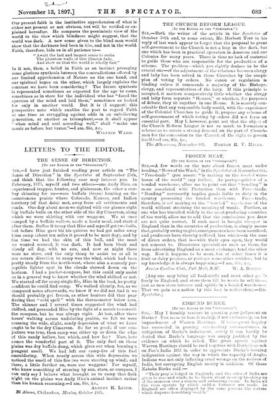LETTERS TO THE EDITOR.
THE SENSE OF DIRECTION.
[To THE EDITOR OF THE "SPECTATOR."] -31R,-4 have just finished reading your article on "The Sense of Direction" in the Spectator of September 25th, and think that the following case may interest you. In February, 1875, myself and two others—one Andy lice, an experienced trapper, hunter, and plainsman, the other a cow- boy skinning for us—were buffalo (bison) bunting on the luonotonous prairie where Colorado, Kansas, and Indian territory (of that date) met, away from all settlements and roads. One day about noon we sighted with our glasses eight big buffalo bulls on the other side of the dry Cimarron, along which we were skirting with our waggons. We at once camped by a buffalo wallow, made a hasty meal, and started after them. Suffice it to say that Rice and myself got two bulls, but before Hice gave his his quietus we had got miles away from camp (about ten miles it proved to be next day), and by the time we had the skin of this ball, and the meat we wanted secured, it was dark. It had been bleak and cloudy all day, with no sun, and now at night there were no stars, and the only thing to assist us at all in our return direction to camp was the wind, which had been pretty steady from the north-west, where also a scarcely per- ceptible lighter spot in the clouds showed down on the horizon. I had a pocket-compass, but this could only assist as in a general way to know whether the wind shifted or not. We started off for camp single file, Rice in the lead, he pretty confident he could find camp. We walked silently, for, as we compared notes afterwards, we knew if we did not find it we should probably get frozen, as other hunters did that year during that "cold spell" with the thermometer below zero. The skinner and I several times suggested the wind had shifted, and persuaded Rice by the light of a match to consult the compass, but he was always right. At last, after three hours' walking across undulating prairie, we felt we were crossing the wide, slight, sandy depression of what we knew ought to be the dry Cimarron. So far so good; if our con- jecture was tree, then camp was either up or down the edge of this sandy hollow, but which, and how far ? Now, here comes the wonderful part of it. The only fuel on those plains was dry buffalo dung, which gives out when burning a pungent smell. We had left our camp-fire of this fuel smouldering. When nearly across this wide depression we noticed the smell of this fire (we were steering up wind), and there, a little farther on, were our waggons ! For myself, who know something of steering by sun, stars, or compass, I can only say I believe what brought us to camp that dark night on the plains was Andy Rice's animal instinct rather than his human reasoning.—I am, Sir, &c.,






































 Previous page
Previous page